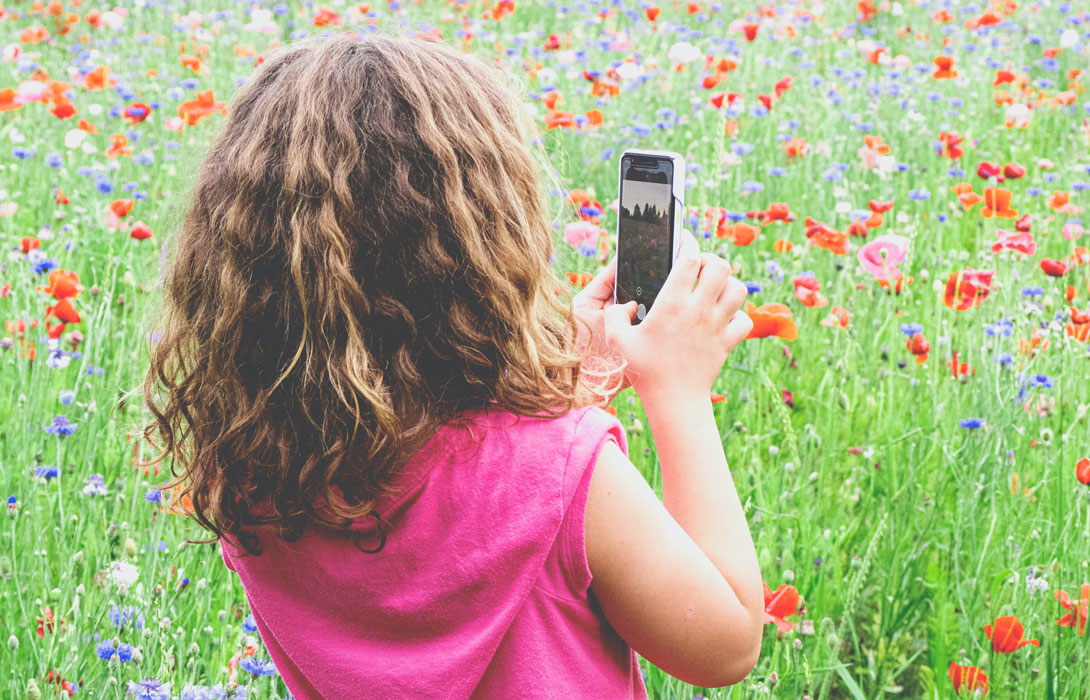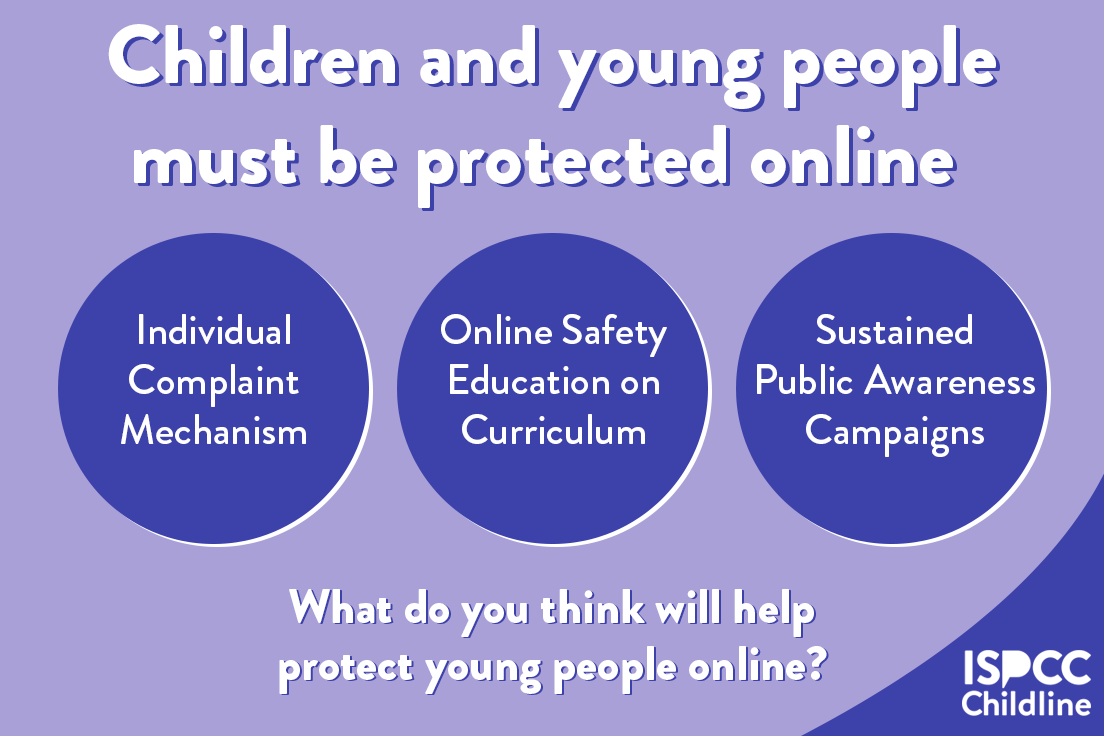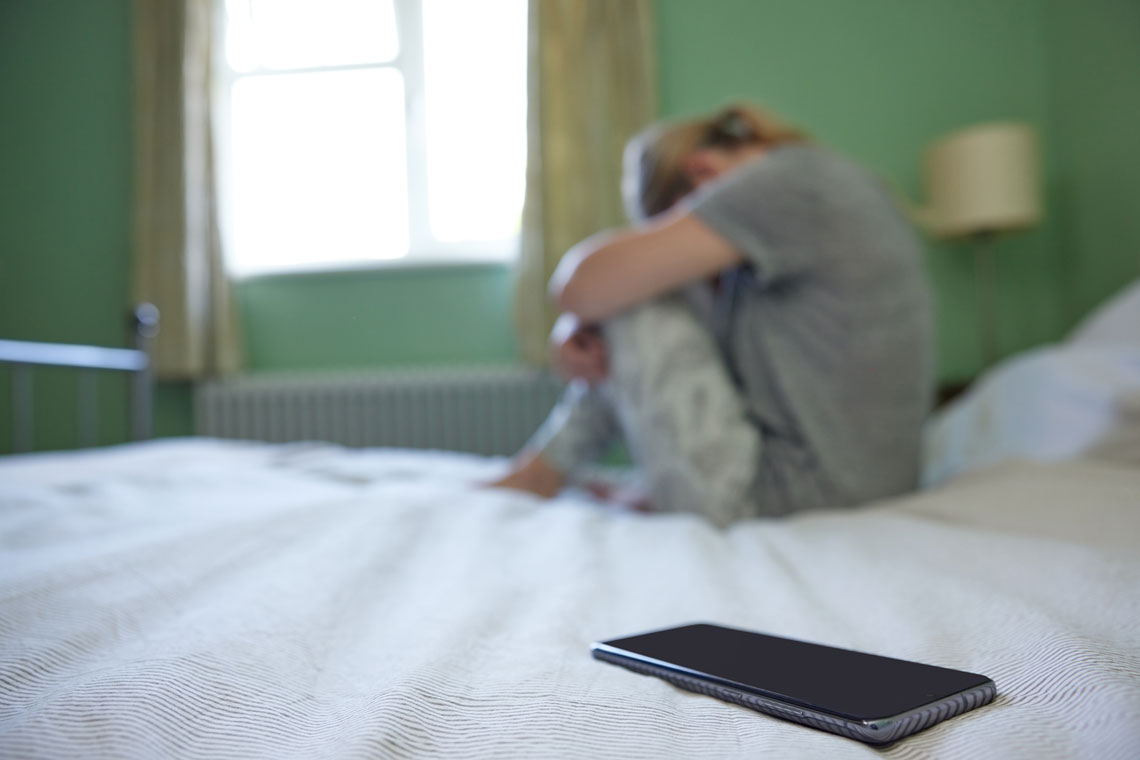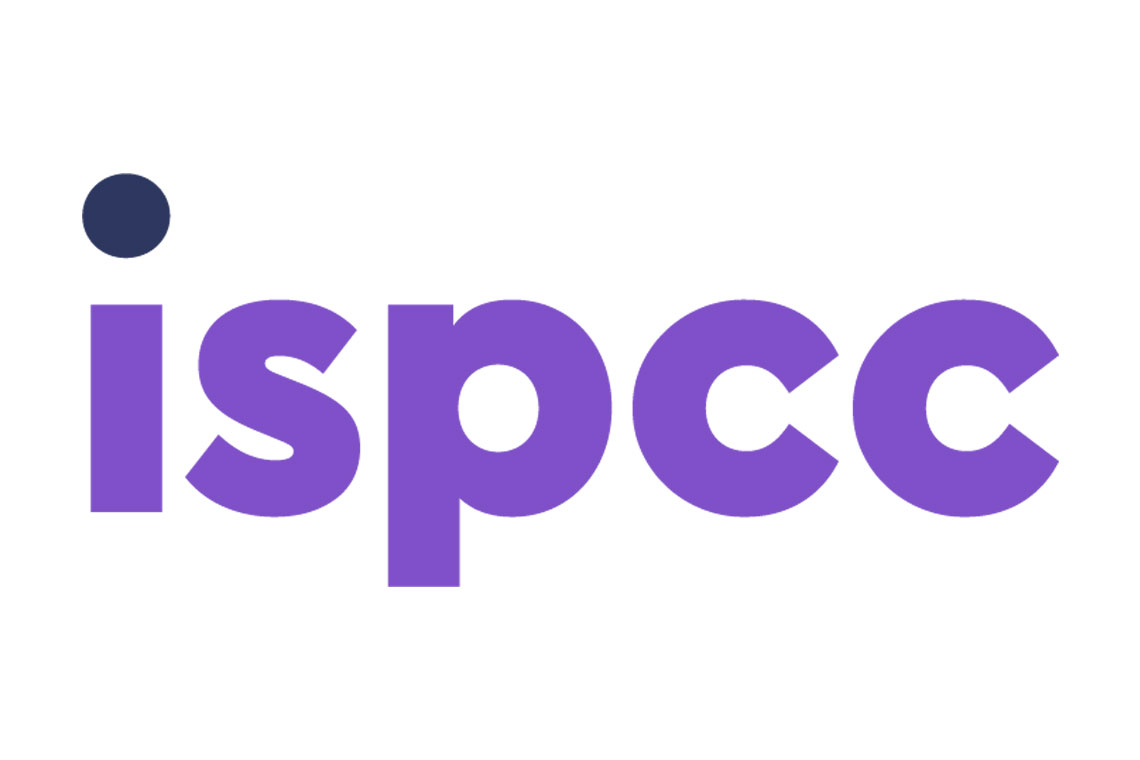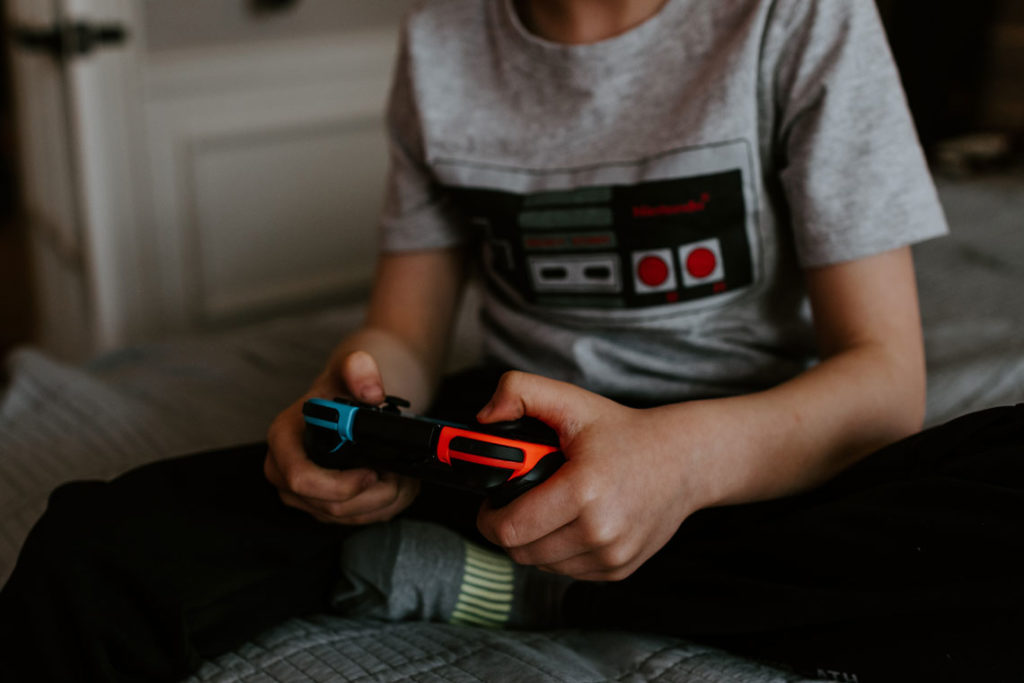Bodywhys Research and Policy Officer, Barry Murphy, talks about the effect social media can have on those living with eating disorders.
Continue reading88% of Irish parents worry about the content their children could see online
To mark the launch of Secure Net, Vodafone Ireland has conducted a national study on the Irish public’s concerns around online safety
Continue readingISPCC Calls for All-of-Society Approach to Keeping Children Safe Online on Safer Internet Day 2022
On Safer Internet Day 2022, ISPCC has called for an all-of-society approach to working to ensure children and young people are better protected online.
Continue readingISPCC cautiously welcomes pivotal moment for children’s safety as Online Safety Commissioner set to be established this year

ISPCC has cautiously welcomed a significant step forward for children and young people’s online safety in response to the Government’s publication today of the Online Safety and Media Regulation Bill.
The bill will see an Online Safety Commissioner established to regulate online services whilst reducing the proliferation of harmful content through binding online safety codes.
The Minister for Tourism, Culture, Arts and Media, Catherine Martin, will be establishing the Online Safety Commissioner on an administrative basis which will allow for recruitment to take place immediately and not result in an even lengthier period before there is a regulator in place.
Whilst the bill does not include the provision of an individual complaints mechanism, which ISPCC has campaigned for over many years as a means of ensuring children and young people who suffer the devastating impacts of cyberbullying can have their experiences heard and addressed appropriately, the Minister has chosen to establish an expert advisory group to examine the issue and report back to her with recommendations on how best to address the matter.
John Church, Chief Executive of ISPCC, said; “When we presented to the Joint Oireachtas Committee on Tourism, Culture, Arts, Sport and Media in May last year, we shared the story of one such young person, Kate, who told us she felt driven to self-harm by the targeted, persistent and all-encompassing bullying she was experiencing across multiple online platforms daily. Individually, the messages Kate was receiving did not meet the investigation thresholds of many of the platforms and sites she used to warrant any action. Viewed in their totality, however, the damage they caused was clear to see.
“Key stakeholders, including ISPCC, went to great lengths in highlighting this substantial flaw in the General Scheme of the bill, including sharing a legal opinion obtained by us clearly showing that the Government is legally obliged to provide for such a system.
“Children and young people have a right to be safe and a right to be heard. Yet, we know these rights are being systematically violated online. Ireland has a bleak history of not listening to children and young people and not acting in their best interests. It is reprehensible thus to see that these failures are continuing into 2022, with the Government approving the publication of such a bill without provision for an individual complaints mechanism. Rather than ensuring those who experience cyberbullying will have access to meaningful redress, this legislation will instead facilitate their continued harm unless and until it includes such a procedure.”
The ISPCC has been to the fore in campaigning for children’s protection online for many years now and will continue to do so until children are able to avail of all the benefits and opportunities being online offers, in a safer and better supported manner. We will take some time now to review the details of the bill and look forward to continuing to contribute to it as it makes its way through the Houses.
Childline is always here for every child and young person in Ireland, for whatever might be on their mind. The listening service can be reached at any time of the day or night online, by phone or by text. For service details, see Childline.ie.
10 questions to consider before getting your child a smartphone
The decision to give your child a smartphone is big and not one to be taken lightly. Here are 10 questions to ask them before you buy it.
Continue readingFive years on from pivotal online safety report, change is still required
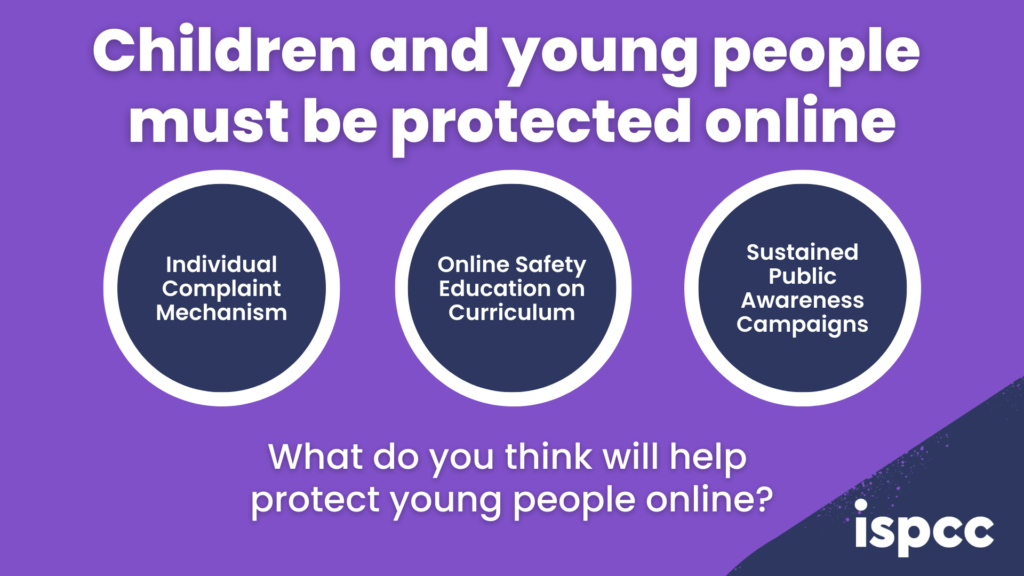
It’s five years today since the Law Reform Commission published its report on Harmful Communications and Digital Safety.
The report proved to be the catalyst much-needed for change in online law and policy.
ISPCC and Vodafone Ireland Foundation
Prior to the publication of the report, the ISPCC and Vodafone Ireland Foundation embarked on a five-year partnership: a key pillar being children’s online safety.
Together, we held a series of conferences amplifying the need for meaningful change.
In May 2017, a multi-site consultation was held with over 100 children and young people. Their key ask of government was for online safety to be taught as a ‘life skill’ on the curriculum.
Action on Online Safety
July 2018:
- Government’s first Action Plan for Online Safety (2018 – 2019) published
- National Council for Online Safety (NACOS), on which the ISPCC has a seat, was established to support the plan.
- We await an impact assessment of the first plan, and indeed any follow-up plan.
January 2020:
- Minister for Communications Richard Bruton published the General Scheme of the Online Safety and Media Regulation Bill.
- This promised to end the era of industry self-regulation and begin a new era of accountability, while addressing the issue of specific online harms.
- The Bill doesn’t provide for an individual complaints’ mechanism – Where a child has a means of accessing redress when they have experienced egregious cyberbullying and platforms fail to remove the harmful content directed towards them or about them effectively and efficiently.
- The Bill has undergone pre-legislative scrutiny by the relevant committee and we await the publication of its report and the next iteration of the Bill.
February 2021
- Minister for Justice Helen McEntee signed the commencement order for the Harassment, Harmful Communications and Related Offences Act – Commonly referred to as ‘Coco’s Law’
- This saw new crimes created to outlaw the non-consensual sharing of intimate images and broadened the scope of the offence of harassment
- While Hotline.ie has been tasked with handling reports of intimate image abuse, little public awareness has been raised as to what people can report, where they can report and what follow-up supports are available to them
Now, we need:
- An Online Safety and Media Regulation Bill to provide for an individual complaints’ mechanism – where an individual can access redress when a platform does not respond effectively or efficiently to their complaint
- Online safety education embedded in our curriculum to build empathetic, resilient and competent digital citizens – to mitigate against future harms and to ensure we have young adults who can compete for the jobs of tomorrow
- A government-led public awareness campaign to identify and address online harms and offences – to signpost those impacted to where they can report and where they can access support
Cyberbullying: How parents and schools can protect children from online harassment
When it comes to school life, bullying has always been a concern. In more recent times the issue of cyberbullying has become more prevalent.
Continue readingISPCC welcomes the establishment of new intimate image abuse reporting service

The ISPCC has welcomed the establishment of a new reporting service for individuals who have had intimate images of them shared without their consent.
Resources provided by Hotline.ie, the national centre for combatting illegal content online, have been enhanced to now include a reporting stream for intimate images shared without consent.
The new service has been established in response to the Harassment, Harmful Communications and Related Offences Act 2020, which provides for two new offences – namely where an intimate image of a person has been shared without their consent, with or without the intent to cause harm.
The ISPCC has previously highlighted to an Oireachtas Justice Committee the harm that can be caused where children and young people share intimate images without consent and the gaps which existed in the law.
ISPCC Chief Executive John Church said: “The ISPCC welcomes that this new service is now in place and will be expertly handled by the team at Hotline.ie. They have significant expertise in analysing such content and well-established reporting protocols in place with many of the online sites and services where such images can end up. This makes a significant difference towards ensuring swift takedowns.
“It is never okay to share such content. We know that children and young people can create self-generated sexually explicit material for many reasons, and we also know the panic and anxiety that can arise when these images end up in the hands of unintended recipients. Children and young people who turn to Childline for support regularly tell the service of the anguish they can experience when intimate images are shared without their consent. While the ISPCC is against criminalising children, it is becoming increasingly important for them to understand the law in this space, even though decisions to act are at the discretion of the DPP.
“Whilst the establishment of this service is to be welcomed, we must also look at what preventative measures can be put in place. Relative and relatable relationship and sexuality education with online safety principles embedded, delivered via the curriculum on a continuum basis at both primary and post-primary level, is a key component in preventing this behaviour occurring in the first instance.”
ISPCC Childline is proud to partner with Webwise, Hotline.ie and National Parents Council (NPC) Primary under the umbrella of the Irish Safer Internet Centre to provide a range of complementary online safety services. Irish Safer Internet Centre partners work towards a shared mission of making the internet a safer and more inclusive environment for children and young people.
Individuals who need to report instances of intimate images of them being shared without their consent can do so by visiting www.hotline.ie/report.
‘Break the Cycle: one report at a time’: ISPCC commends Hotline.ie on its dedication to combatting child sexual abuse online
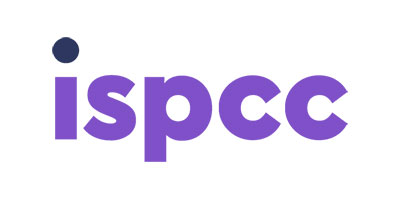
Today, Hotline.ie launched its annual report for 2020 ‘Break the Cycle: one report at a time’ highlighting that it received 10,583 reports from the public, with 2,852 identified as containing child sexual abuse material (CSAM).
The report goes on to highlight that the service has seen a 142 per cent increase in CSAM which appeared to have been self-generated; mainly girls under 15 years of age, where signs of coercion or grooming were evident. Whilst 42 per cent of the CSAM detected appeared to be produced for financial gain, with one in two reports containing video content. Girls (81 per cent) predominantly featured in all CSAM detected, with 78 per cent between the ages of four to 12 years of age, and seven per cent believed to be three years of age or younger. These are frightening and stark findings.
Children who are abused and exploited in this way often speak about the additional trauma they experience from knowing the images of their abuse are still online and can be viewed by anyone. The ISPCC commends the dedication and hard work of all the Hotline.ie team in their efforts to protect children online and to prevent this re-victimisation.
John Church, ISPCC Chief Executive commented: ‘I congratulate Hotline.ie, our partners in the Irish Safer Internet Centre, on another impactful year. ‘Breaking the cycle’ of CSAM online is key to lessening the proliferation of these abusive images and the subsequent re-victimisation of the child. Child sexual abuse is an issue we need to be talking about more: understanding its prevalence, recognising its impact, and actively and collaboratively working together on protecting against it.’
‘Hotline.ie’s annual report shows that those who want to sexually abuse and exploit children become ‘au fait’ with how to manipulate existing technologies and its design flaws for their end game. We know that some platforms are planning on introducing end-to-end encryption on their services. This will have a devasting impact on the work agencies like Hotline.ie and law enforcement are trying to do. Technologists, innovators and policy-makers must find a way for privacy and child protection to co-exist online.’
Hotline.ie works to combat child sexual abuse and exploitation online to protect children within Ireland and abroad from these heinous crimes, reaffirming the borderless nature of the issue.
Today’s Hotline.ie insights come as NSPCC in the UK reveal that figures obtained by them show that online grooming crimes recorded by police have increased by almost 70 per cent in the last three years, highlighting how the flawed design of technology is allowing perpetrators to access children for nefarious purposes.
John Church: ‘The ISPCC also supports Hotline.ie’s ask that we ‘call it for what it is’: child sexual abuse material. Language is important to mitigate any notion that such a crime be viewed as consensual and/or victimless, and we must all be cognisant that this type of content is abuse and exploitation, and nothing less.’
The ISPCC encourages companies to sign up to and adhere to the Hotline.ie’s Code of Practice to ensure the swift takedown of this content whilst affording an opportunity for child victims to be identified and rescued. If anyone is concerned that something they have seen online is sexually abusive and/or exploitative to a child, the ISPCC ask that you please report to Hotline.ie. It is up to each of us to ‘Break the Cycle: one report at a time.’
Online video games and children: How to control their spending
When it comes to entertaining children of any age, particularly during the school holidays, the pastime of choice for many children and teenagers is playing video games.
Continue reading



